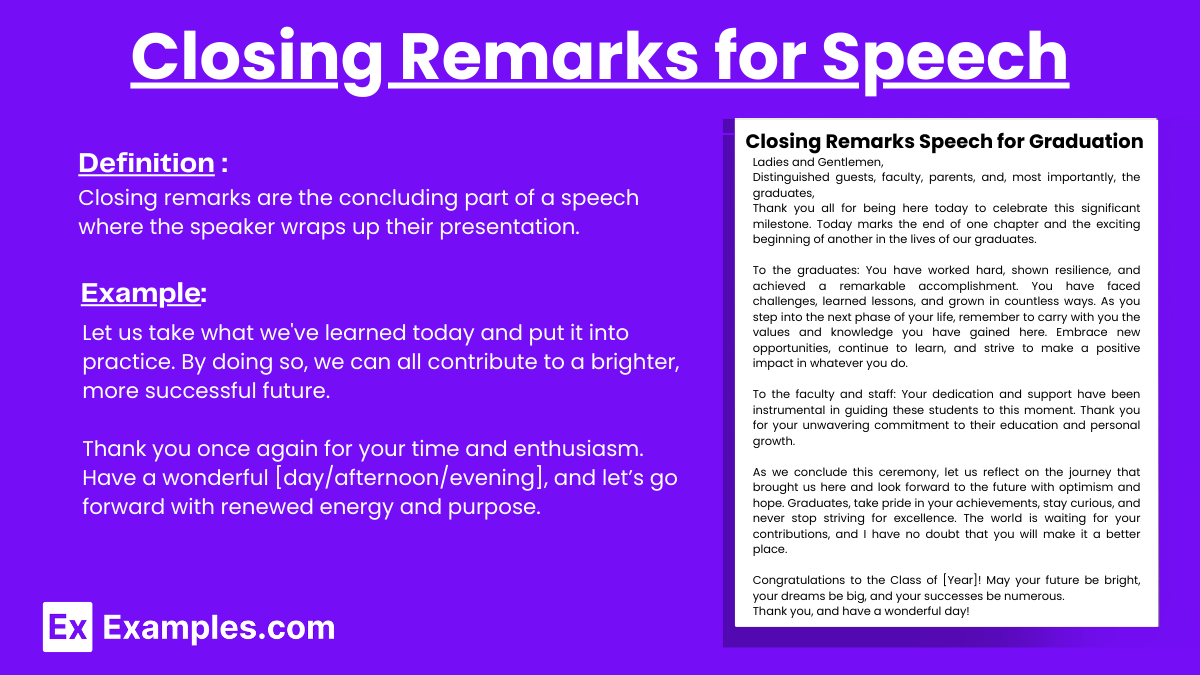32+ Closing Remarks for Speech Examples
Closing remarks are the concluding part of a Speech where the speaker wraps up their presentation. This section typically summarizes the key points discussed, reinforces the main message, and leaves the audience with a final thought or call to action. Closing remarks are important as they provide a sense of closure and can have a lasting impact on the audience.
What is Closing Remarks for Speech?
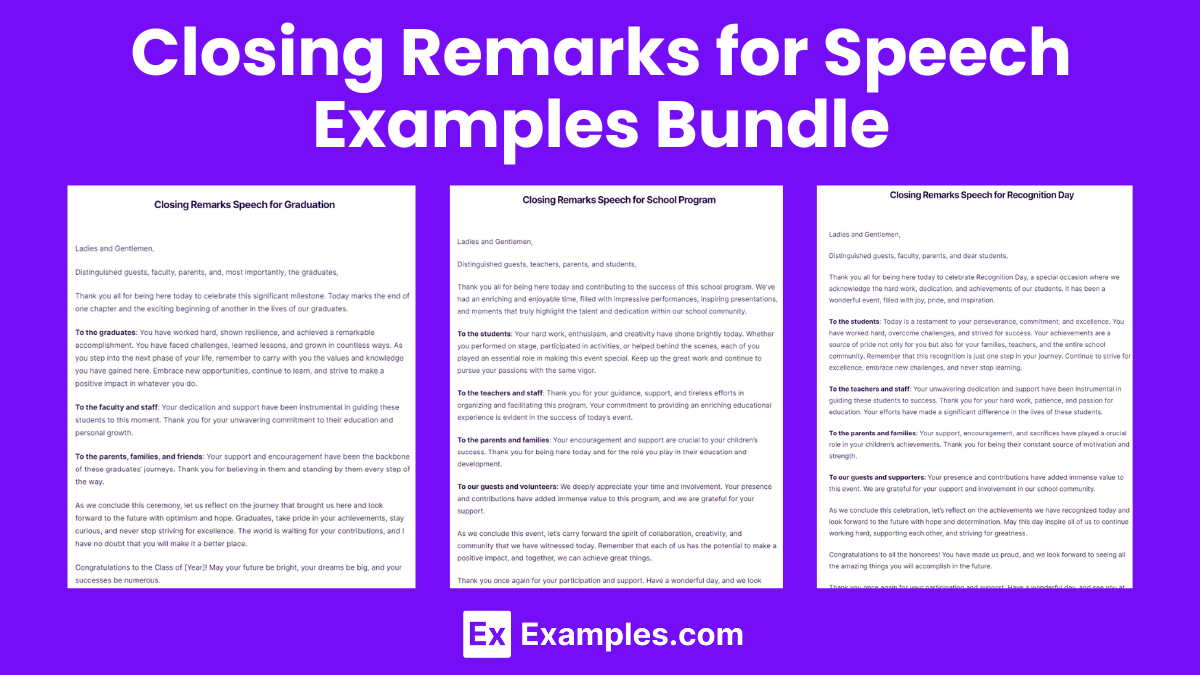
Closing Remarks for Speech Bundle Download
Closing Remarks for Speech Format
1. Summarize Key Points
Briefly recap the main ideas or arguments presented in your speech.
Example: “Today, we discussed the importance of time management, practical strategies to implement it, and the benefits it brings.”
2. Reinforce the Main Message
Emphasize the core message or takeaway you want the audience to remember.
Example: “Remember, effective time management is crucial for reducing stress, increasing productivity, and achieving your goals.”
3. Call to Action
Encourage the audience to take specific actions or steps based on your speech.
Example: “I encourage each of you to start using a planner, set specific goals, and tackle your most important tasks first.”
4. Thank the Audience
Express gratitude for their time and attention.
Example: “Thank you all for your attention and engagement today.”
5. End with a Memorable Closing
Finish with a powerful quote, a thought-provoking statement, or an inspiring note.
Example: “As the saying goes, ‘The bad news is time flies. The good news is you’re the pilot.’ Make the most of your time and steer your life towards success.”
Closing Remarks for Speech Example
Short Closing Remarks for Speech Example
Closing Remarks for Speech for Graduation
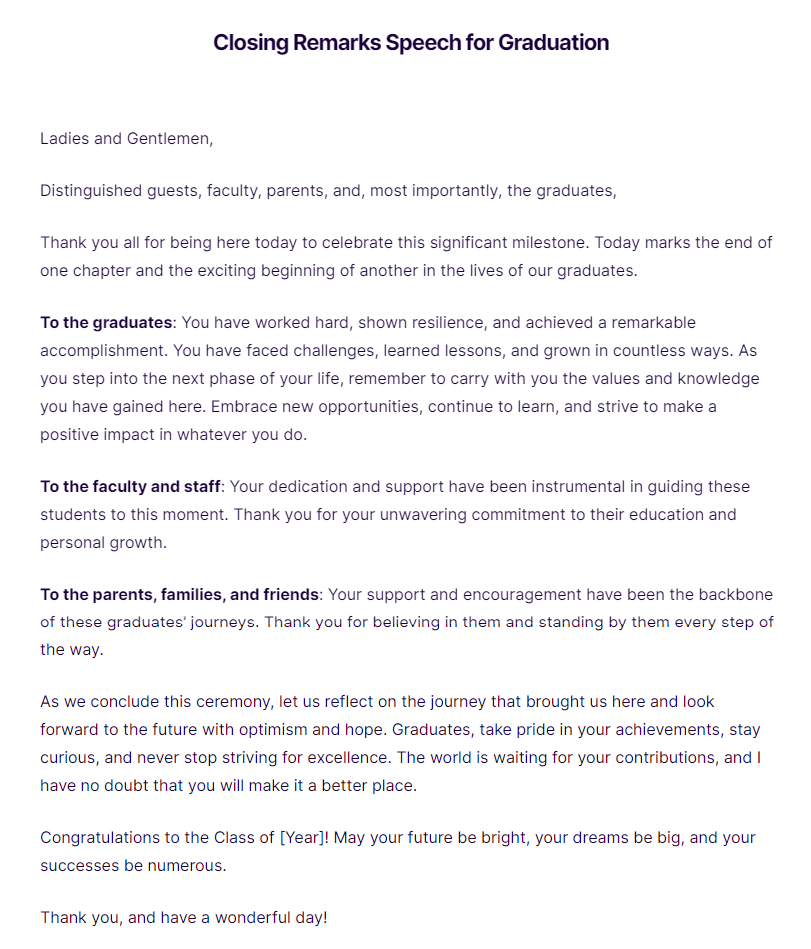
Closing Remarks for Speech for School Program
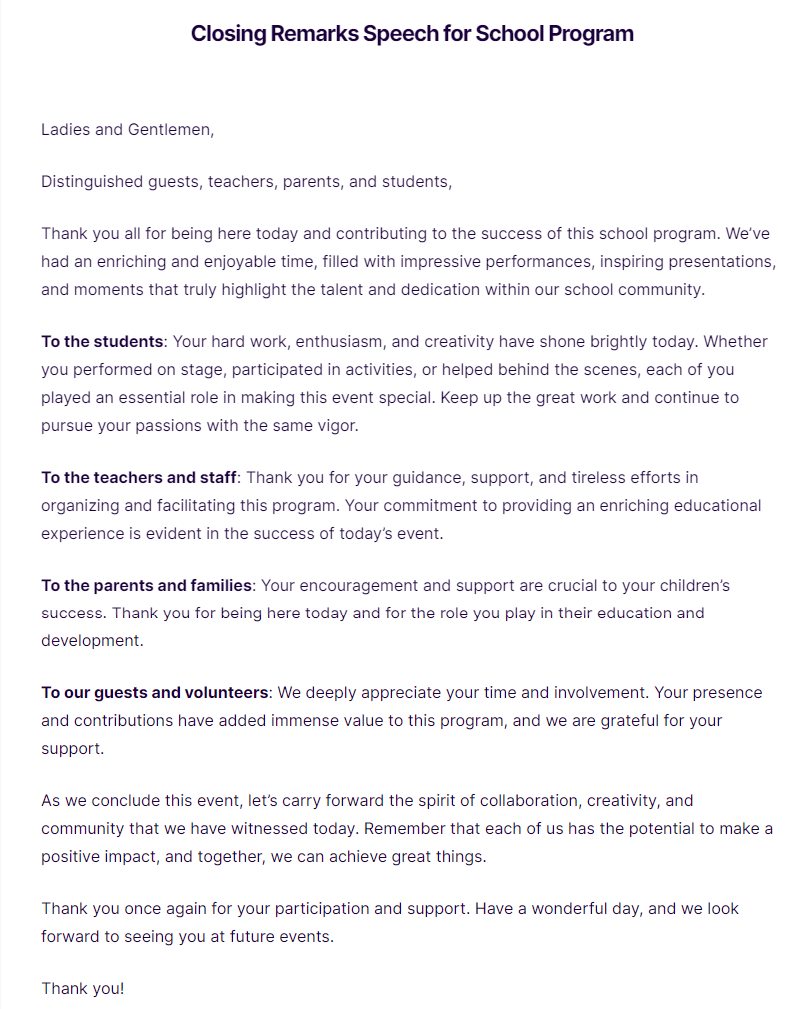
Closing Remarks for Speech for Recognition Day
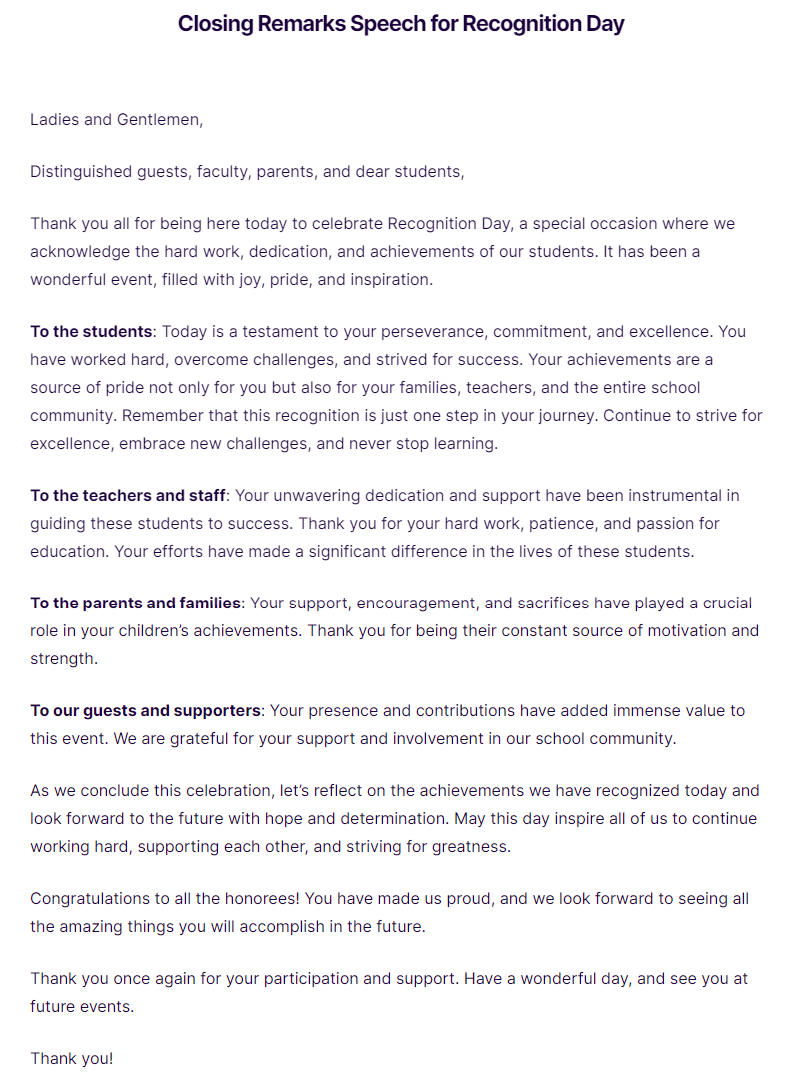
More Closing Remarks for Speech Topics
- Closing Remarks Speech for an Event
- Closing Remarks Speech for Seminar
- Closing Remarks Speech for Teachers Day
- Closing Remarks Speech for Christmas Party
- Closing Remarks Speech for Valedictorian
- Closing Remarks for Speech Contest
- Closing Remarks Speech for Wedding
- Closing Remarks Speech for Conference
- Closing Remarks Speech for Award Ceremony
- Closing Remarks Speech for Farewell
- Closing Remarks Speech for Workshop
- Closing Remarks Speech for Business Meeting
- Closing Remarks Speech for Retirement
- Closing Remarks Speech for Fundraiser
- Closing Remarks Speech for Community Event
- Closing Remarks Speech for Gala
- Closing Remarks Speech for Annual General Meeting
- Closing Remarks Speech for Orientation
- Closing Remarks Speech for Leadership Summit
- Closing Remarks Speech for Charity Event
- Closing Remarks Speech for Memorial Service
- Closing Remarks Speech for Family Reunion
- Closing Remarks Speech for Corporate Event
- Closing Remarks Speech for Product Launch
- Closing Remarks Speech for Training Session
- Closing Remarks Speech for Cultural Festival
- Closing Remarks Speech for Political Rally
How to Write Closing Remarks for Speech
1. Summarize Key Points
Briefly recap the main ideas or arguments presented.
Example: “Today, we discussed the importance of time management, practical strategies to implement it, and the benefits it brings.”
2. Reinforce the Main Message
Emphasize the core message or takeaway you want the audience to remember.
Example: “Remember, effective time management is crucial for reducing stress and achieving your goals.”
3. Call to Action
Encourage the audience to take specific actions based on your speech.
Example: “I encourage you to start using a planner and prioritize your tasks.”
4. Thank the Audience
Express gratitude for their time and attention.
Example: “Thank you all for your attention.”
5. End with a Memorable Closing
Finish with a powerful quote, a thought-provoking statement, or an inspiring note.
Example: “As the saying goes, ‘The bad news is time flies. The good news is you’re the pilot.’ Make the most of your time.”
Tips to Deliver Closing Remarks for Speech
1. Summarize Key Points: Briefly recap the main ideas discussed in your speech.
2. Reinforce the Main Message: Emphasize the core message you want the audience to remember.
3. Call to Action: Encourage the audience to take specific steps or actions based on your speech.
4. Express Gratitude: Thank the audience for their time and attention.
5. End with a Memorable Closing: Finish with a powerful quote, thought-provoking statement, or inspiring note.
Why are closing remarks important?
They reinforce the message, ensure audience retention, and provide a clear, memorable conclusion.
How should I structure closing remarks?
Summarize key points, thank the audience, and end with a powerful, memorable statement or call to action.
Can I include a quote in my closing remarks?
Yes, a relevant and impactful quote can effectively reinforce your message and leave a lasting impression.
What should I avoid in closing remarks?
Avoid introducing new information, being too lengthy, or ending abruptly without a clear conclusion.
How do I make my closing remarks engaging?
Use a strong, positive tone, include a personal touch or story, and connect emotionally with the audience.
Can humor be part of closing remarks?
Yes, appropriate humor can leave a positive impression and end your speech on a high note.
How long should closing remarks be?
Closing remarks should be concise, typically lasting no more than a few minutes.
What is a call to action in closing remarks?
A call to action urges the audience to take specific steps or actions related to your speech’s message.
Should I thank the audience in my closing remarks?
Yes, thanking the audience shows appreciation and fosters a positive connection.
Can I use a rhetorical question in my closing remarks?
Yes, a rhetorical question can provoke thought and leave the audience reflecting on your message.



